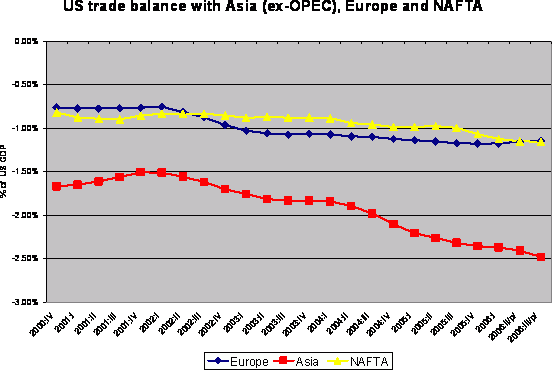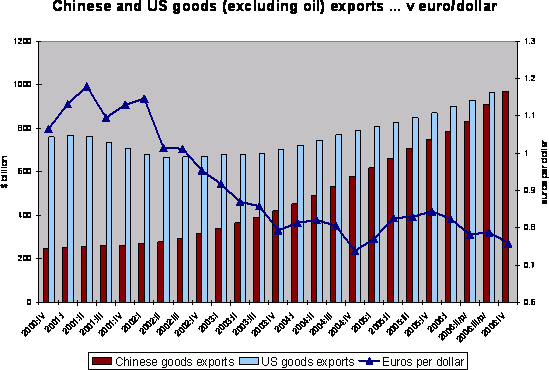It may take more than strong growth abroad to bring the US trade deficit down …
More on:
There is a lot of talk now about how stronger growth outside the US (along with somewhat slower US growth) will bring the trade deficit down. See among others Justin Lahart’s column in Thursday's Wall Street Journal – which picks up on themes that Richard Berner and others have been pushing for some time.
The basic argument makes sense. Relative growth rates matter. Stronger growth outside the US and slowing growth in the US should help stabilize the trade balance.
But the standard argument still strikes me as a bit too simplistic. No region of the world economy has been growing faster than Asia, and few countries have been growing faster than China. Yet the US trade deficit with Asia as a whole is growing, not shrinking. That doesn't seem to be changing: the recent acceleration in Chinese export growth has been matched by a slight acceleration in the deterioration of the overall US bilateral trade balance with Asia.
Look at the following chart, which shows the US trade deficit with various regions of the world economy on a rolling four quarter basis. The bilateral deficit with Asia seemed to blip up in q3 even as the broader US economy slowed.
Europe is a bit different. European growth has picked up even as US growth slowed. And the euro has strengthened. Those two forces have already combined first to stabilize the US bilateral trade balance with Europe and now to bring it down as a percent of US GDP.
The US deficit with Canada and Mexico has also stabilized. That likely reflects an improving balance in non-energy trade, and a deteriorating balance in energy trade.
What differentiates Europea and Canada from Asia? Exchange rate appreciation.
Why does the exchange rate matter? Simple. US exports to Europe -- and to the world generally -- responded strongly to the dollar's fall v. the euro. Of course, the US hasn't been the only beneficiary of a weaker dollar. Chinese exports responded to the fall in the dollar -- which the RMB tracked down -- even more strongly.

One final chart. Bizarrely, that the US bilateral trade deficit with Asia has tracked the US trade deficit with the oil countries.

The correlation here is probably a false correlation. Asian growth has been driven by exports to the US and Europe. And the combination of strong Asian growth and decent demand growth in US and Europe has pushed up oil prices. Ergo – a rising Asian surplus with the US has been correlated with rising oil prices and a rising US bilateral deficit with big oil exporters (other than Canada/ Mexico).
That’s the rub to the stronger growth outside the US story. China's strong growth has been export-driven -- its surpluses with the US, Europe and the world as whole have grown dramatically. Faster Chinese growth propelled by a further acceleration in Chinese exports won't help bring the US deficit down. Asia more generally doesn’t need to grow faster so much as the composition of Asian growth needs to change.
And strong global growth, to the extent that it pushes up commodity prices, has offsetting effects on the trade balance. That seems to me to be one of the lessons of the past few years -- years when the US deficit has increased even as the world economy has grown faster than the US economy.
Oil will probably average about $60 a barrel in the US data for 2006. So if oil stays at $60 in 2007, oil won’t add to the US trade deficit for the first time in a long time. That will help. If oil falls back to $50, that will really help. But that is an oil price story as much as a stronger growth outside the US story.
My bottom line. Strong growth abroad and exchange rate adjustment will, with time, reduce the US trade deficit. Stronger growth without exchange rate adjustment may not. And if growth outside the US is strong enough to keep up oil prices even if the US slows, well, that doesn’t obviously help either ...
More on:
 Online Store
Online Store